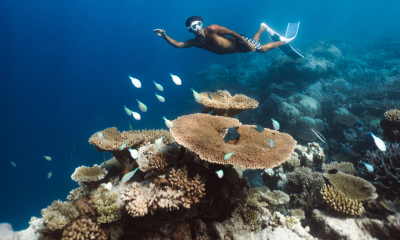Action
Coral reef restoration at Amaya Kuda Rah Maldives

Known internationally as one of the world’s best scuba diving destinations, Maldives has an abundance of dive sites with a unique underwater beauty to explore. The islands of the Maldives have consistently warm waters with outstanding visibility throughout the year, and consist of exhilarating dive sites such as vibrant thilas, exciting channels, coral-filled overhangs and fascinating wrecks.
Maldives’ world-renowned coral reefs play a fundamental role in food production, shoreline protection, and tourism revenue, but ocean plastic threatens the survival of shallow coral reefs. Preservation of the reefs has become more important than ever.
In 1998, a severe El Niño event resulted in unusually warm waters (3-4 °C) above normal. This caused a mass bleaching and die off of Maldivian coral reefs.
Just as recovery reached its peak, another El Niño hit. The 2015-2016 El Niño weather phenomena and associated sea surface temperature anomalies in 2016 caused one of the largest recorded episodes of mass bleaching in the Maldives. A subsequent survey of 71 sites across the Maldives conducted by IUCN found that 73 per cent of corals had undergone bleaching, indicating a severe bleaching event.

Being one of the new additions to the vast collection of resorts in the pristine South Ari Atoll, Amaya Kuda Rah Maldives had embarked on a project to restore the surrounding coral reef, which was also affected as a result of the 2016 El Niño. On acquiring the resort in mid-2016, Hayleys PLC of Sri Lanka realised the important role the island’s reef played in protecting the surrounding natural habitat. The resort partnered with Reefscapers Maldives, and commenced a coral conservation and regeneration project in March 2017.
“With the personal commitment and initiative taken by our Chairman towards this project, we introduced their artificial coral frame reef system, which have been placed successfully since the year 2001 in several resorts in Maldives. The shape of the frames reduced coral predation and sedimentation and provided a suitable substrate on to which coral could grow. In addition Reefscapers also conducts awareness training to the resort team during their visits to increase awareness and taking ownership as well on our commitment,” Michael Armstrong, the General Manager at Amaya Kuda Rah Maldives, said.
The coral frames are designed and made on the local island of Fulhadhoo in Baa atoll — a unique opportunity, started by Reefscapers Maldives, that provides employment for several local people and allows them to develop skills outside of traditional fishing. The transplantation process involves attaching coral fragments onto the metal frame, which grow and mature into new colonies. The fragments are collected from broken natural reef corals, and later harvested from own mature coral frames for the “second generation”.
In 2017, the first frames were placed on the north-east side of the reef, and the growth rate has been amazing! In just two-three weeks, the coral fragments have attached themselves onto the frame. Two months later, new coral growth was evident and fish had moved in.

Throughout the year, Amaya Kuda Rah Maldives’ on-property dive centre oversees the project. For every frame, the team at Divepoint Maldives follows a strict monitoring process, taking regular photographs of the coral growth, and identifying the marine life that starts to colonise the frames. By propagating the most successful species, the team is developing ever-more resistant coral offspring, better adapted to withstand higher sea water temperatures and so help the reefs in their fight against global warming.
“The positive impact of the project has been seen over the past couple of years in the surrounding reef, as well as for the guest experience whilst snorkelling, due to the increase in the number of several fish species brought on by the new coral habitat provided by the coral farm. The ongoing work will surely enhance the guest experience further by providing a better snorkelling experience of the reef surrounding the resort island,” Armstrong said.

Exactly two years since its inception in March 2017, the project has advanced into the second phase. With additional funding from Hayleys PLC and its subsidiary Amaya Resorts, more coral frames are being placed along the western side of the island, which will bring the number of frames submerged around the Kuda Rah island to over 70 in the coming months. The resort has plans to add even more frames to several other areas, including its main dive point and around the water villas.
The programme is also now open to sponsorship. Guests can choose the size of frame and, if they like, dedicate it to someone special or put their own name on it. The Divepoint team will build the personalised coral frame and add it to the reef ecosystem. Sponsors will receive bi-annual photo updates of their coral frame via Reefscapers’ website. Proceeds from each frame go into an environmental fund established by the resort to support its marine conservation research programmes and community initiatives.

Coral reefs are invaluable to the fishing and tourism industry — two major economic activities in the Maldives. They protect the shoreline from storm damage and help manage carbon dioxide levels. However, 60 per cent of the world’s coral reefs are estimated to be threatened due to human activity. The full extent of damage sustained by the 2016 El Niño is still unknown!
Artificial reef projects have become an invaluable tool for restoring reefs and nurturing the damaged reefs back to health. With its ambitious initiative, Amaya Kuda Rah Maldives is leading by example.
Action
Atmosphere Foundation launches annual dive training scholarship for Maldivians
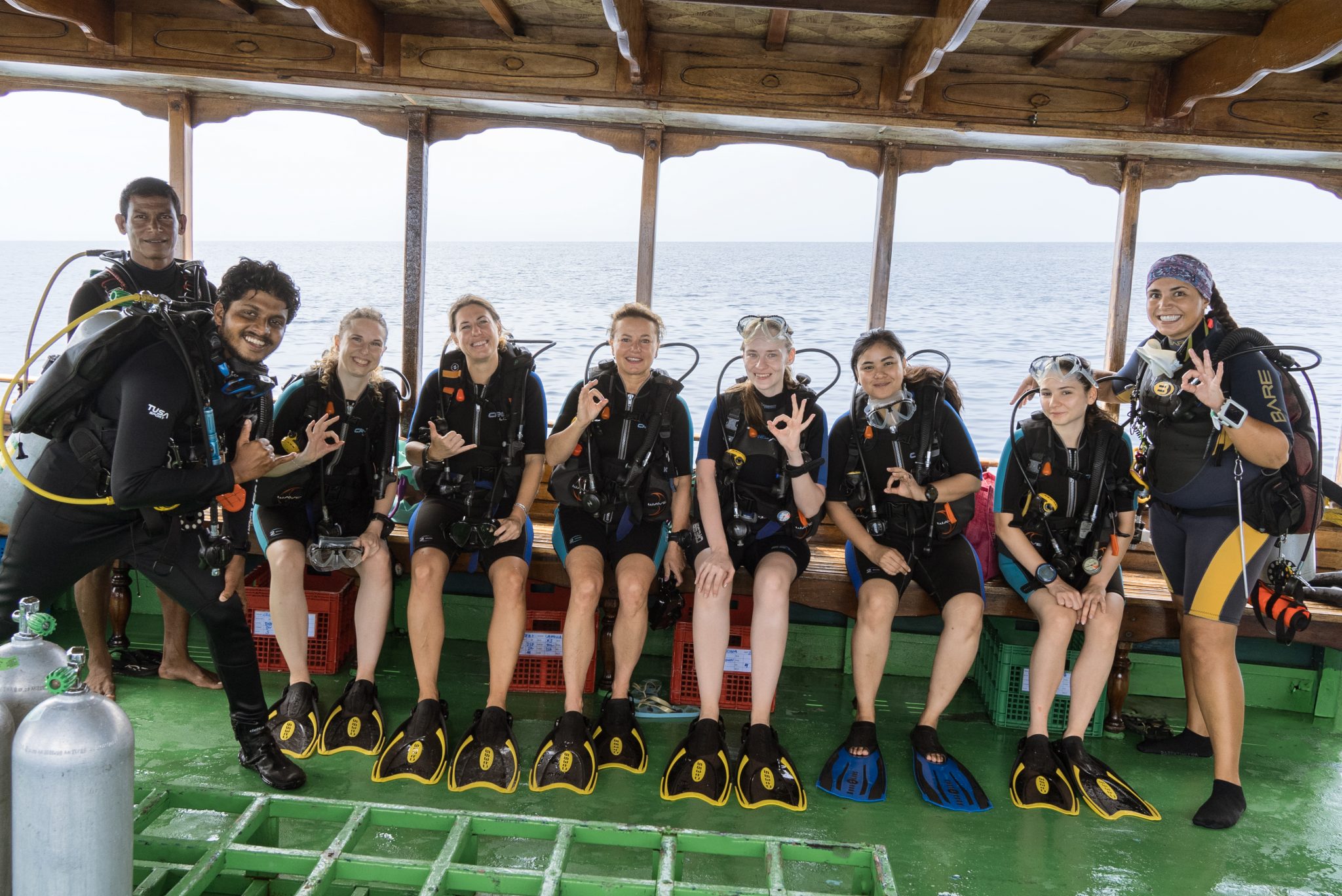
Atmosphere Foundation has launched a new annual scholarship programme that will sponsor 10 Maldivians each year to complete internationally recognised scuba diving training and professional development pathways, supporting youth career growth while strengthening the Maldivian workforce in tourism.
Designed to create clearer entry points into the industry and help Maldivians advance from foundational training to professional roles, the programme will provide sponsored candidates with access to a structured set of certifications that can lead to employment opportunities in resort dive centres, watersports operations, and marine excursions across the country.
The programme will support both beginners and those already working in the sector who want to progress further. By sponsoring these certifications, the initiative aims to help participants develop technical competence, safety capabilities and professional readiness—skills that are essential for career progression in dive and marine-related roles within the tourism industry.
To ensure the programme delivers direct long-term value to the Maldives, successful candidates will be required to work in the Maldives for a specified period after completing their course. This service commitment is intended to strengthen local capacity within the tourism workforce, help resorts access qualified Maldivian professionals, and support career continuity for young people entering the sector.
“Tourism is the Maldives’ greatest economic mainstay, and our future depends on ensuring Maldivians are represented across the industry—not only at entry level, but in specialist and leadership positions as well,” said Abdul Azeez Abdul Hakeem, Vice President of Atmosphere Foundation. “This programme is designed to remove barriers to training, equip young people with globally recognised qualifications, and support them to progress from the beginning of their careers to new heights. The service component also ensures that the skills gained remain in the Maldives and contribute to the development of our tourism workforce.”
Atmosphere Foundation continues to develop and support initiatives that contribute to community wellbeing and opportunity, with a focus on empowering youth, building skills, and creating sustainable pathways for Maldivians. The annual dive training sponsorship programme builds on the Foundation’s broader mission to deliver meaningful, practical support that helps individuals and communities thrive—while contributing to the long-term resilience of the national economy.
Further information on how to apply, programme partners and timelines will be announced soon through Atmosphere Foundation’s official channels.
Action
Bestbuy Maldives supports health, wellness as Main Sponsor of MNU Marathon 2026
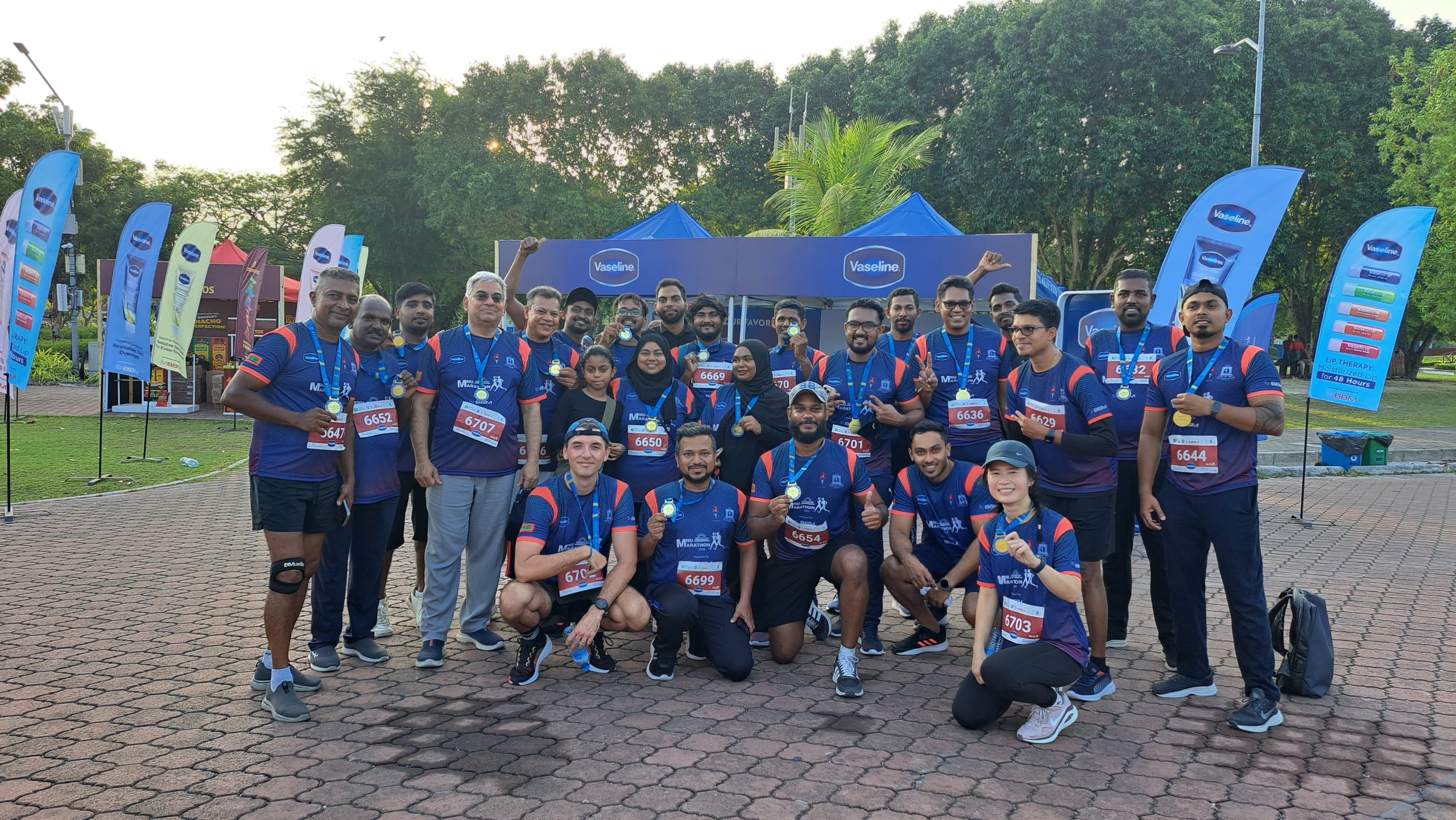
Bestbuy Maldives (BBM), one of the Maldives’ leading and most trusted distribution partners to the hospitality and retail sectors, served as the Main Sponsor of the MNU Marathon 2026, organised by Maldives National University (MNU) and held in Hulhumalé on 13 February. The event drew over 1,500 runners and focused on promoting fitness, health and wellness, active lifestyles, and community unity, as part of a long-term sponsorship arrangement.
As Main Sponsor, BBM maintained a strong on-ground presence throughout the marathon, with high brand visibility and activations designed to engage participants and spectators.
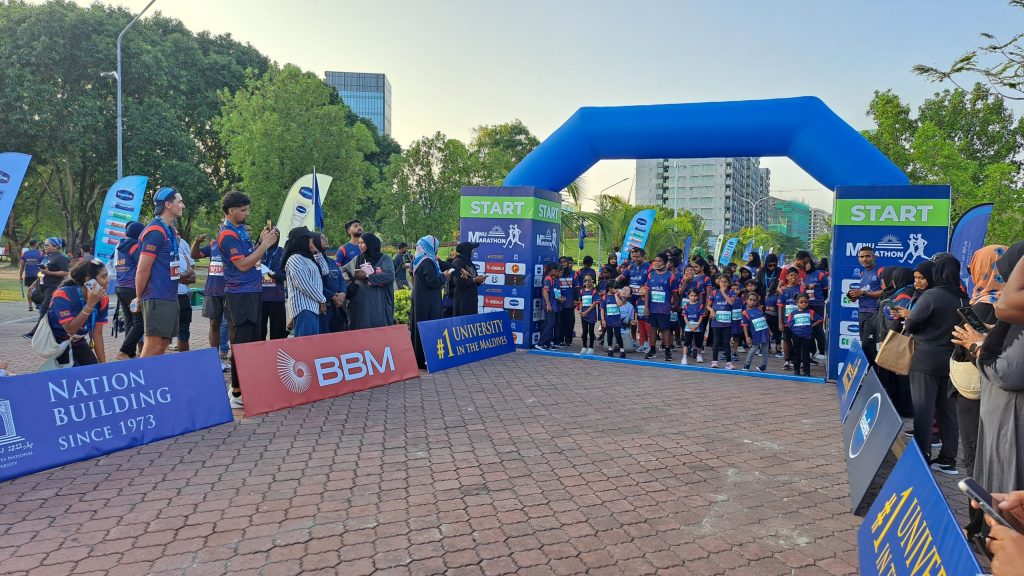
A key highlight was BBM’s collaboration with Unilever – Vaseline, with free product samples distributed to all marathon participants, reinforcing messages around skincare. Additional brand activations included a dedicated Cornitos stall offering free nacho samples, and a Godrej Aer booth focused on product sampling and brand awareness. BBM also distributed Cavin’s milkshake samples to runners at the finish line.
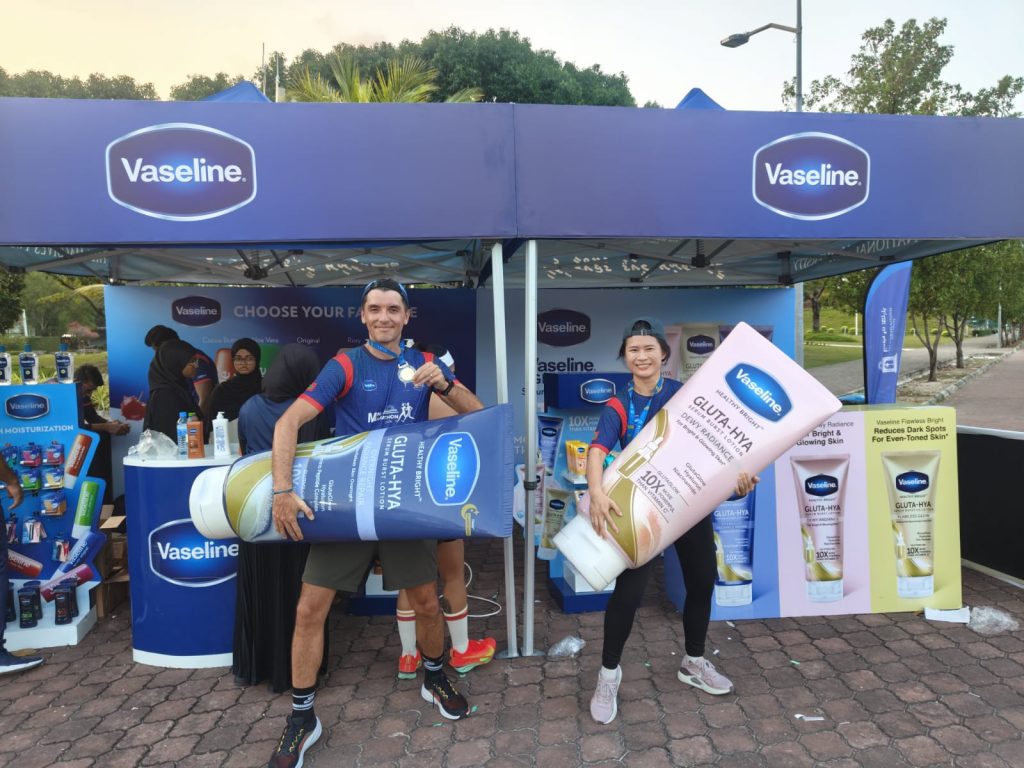
BBM’s participation extended beyond sponsorship, with more than 50 BBM employees taking part in the marathon as runners. Representatives from Unilever International also joined the run, underscoring a shared commitment to wellbeing and community engagement.
“Supporting the MNU Marathon aligns closely with BBM’s commitment to healthier communities and meaningful national partnerships,” said Ali Afrah Hassan, Head – Human Resources, Administration & Corporate Affairs at Bestbuy Maldives. “It was especially rewarding to see our colleagues participate as runners alongside the wider public, demonstrating that wellbeing is part of our culture, not just our sponsorship. We are proud to work with MNU to create a positive platform that brings people together around health, wellness and unity.”
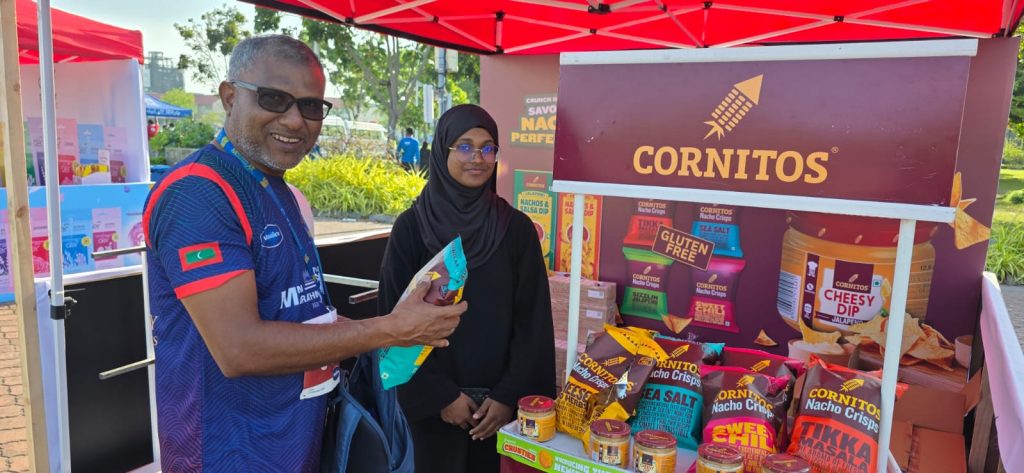
Through its portfolio of internationally recognised FMCG and consumer lifestyle brands—spanning food and beverage, personal care, and home care—BBM continues to support initiatives that create shared value for communities, partners and customers across the Maldives. The company’s involvement in events such as the MNU Marathon reflects BBM’s broader commitment to championing positive lifestyles, strengthening local partnerships, and backing platforms that bring people together with purpose.
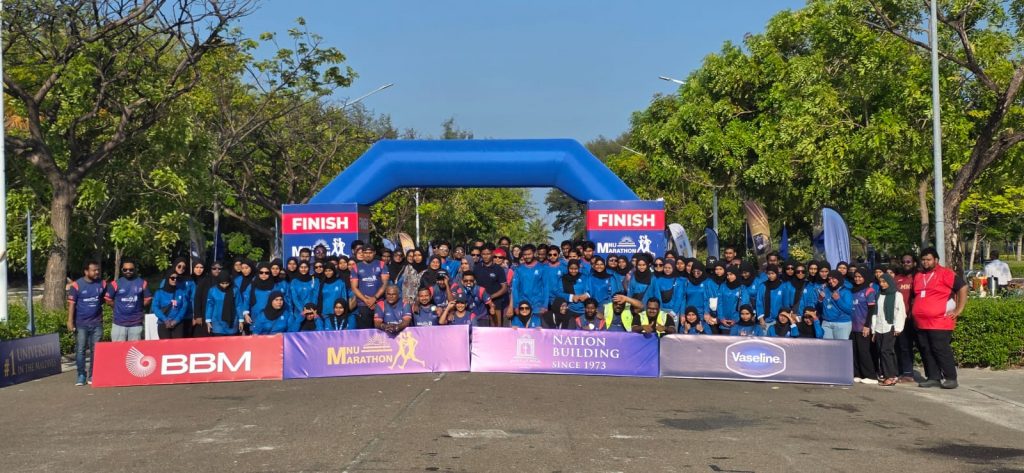
BBM noted that the event strengthened its partnership with Maldives National University and provided an opportunity to connect directly with the Maldivian community in an uplifting setting, reinforcing BBM’s role as a responsible corporate partner supporting national initiatives.
Action
LUX Tennis joins St. Regis Maldives Vommuli to expand active lifestyle programme

St. Regis Maldives Vommuli Resort has announced a partnership with LUX Tennis, strengthening the resort’s established tennis offering and introducing plans for a new padel court. The collaboration expands the resort’s active lifestyle programme, with a particular focus on families and multi-generational travel.
The St. Regis brand draws on the legacy of the Astor family, founders of the original St. Regis New York, whose Gilded Age lifestyle celebrated refined leisure and sporting pursuits. Tennis, in particular, became a symbol of elegance within the Astor social circle, reflecting a culture shaped by hospitality, recreation and sophistication. This heritage continues across the St. Regis portfolio today, where classic sports remain an integral part of the brand’s identity.
Set within the resort’s private island environment, the enhanced LUX Tennis programme is designed to elevate on-island tennis experiences for guests of all ages and skill levels. The programme features expert-led coaching, bespoke clinics and visiting residencies by internationally recognised professionals, offering guests opportunities to train, play and engage with elite talent in an accessible and inspiring setting.
Confirmed visiting professionals include Angelique Kerber, three-time Grand Slam champion and former world number one, who will visit from 29 to 31 March 2026, and Feliciano López, former Spanish champion with a career-high singles ranking of world number 12, scheduled from 16 to 17 May 2026.
The expanded tennis programme is designed to integrate seamlessly with island life, offering everything from relaxed family matches and junior-friendly coaching to more focused sessions for experienced players. Activities are structured to complement time spent at the beach, spa experiences and family dining.
The St. Regis Maldives Vommuli Resort features 77 beachfront and overwater villas, each with a private pool, alongside facilities such as the John Jacob Astor Estate, the largest overwater three-bedroom villa in the Maldives. Guests also have access to the award-winning Iridium Spa, six dining venues and a private yacht available for charter, reinforcing the resort’s positioning as a destination for both leisure and active pursuits.
-
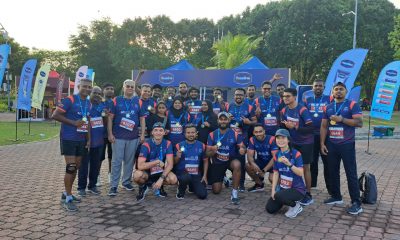
 Action1 week ago
Action1 week agoBestbuy Maldives supports health, wellness as Main Sponsor of MNU Marathon 2026
-

 Cooking1 week ago
Cooking1 week agoMaagiri Hotel invites guests to celebrate Ramadan with daily Iftar
-

 Awards1 week ago
Awards1 week agoEllaidhoo Maldives secures HolidayCheck Gold Award for second consecutive year
-
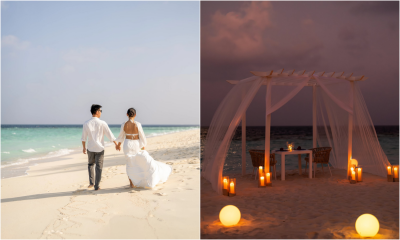
 Love1 week ago
Love1 week agoRomance in nature: Valentine’s week at Eri Maldives
-
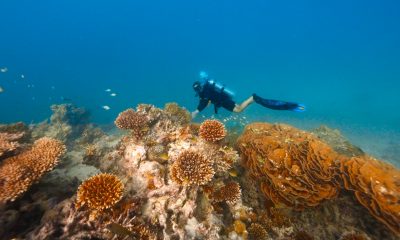
 News6 days ago
News6 days agoVentive Hospitality aligns Maldives portfolio with Green Fins marine sustainability platform
-
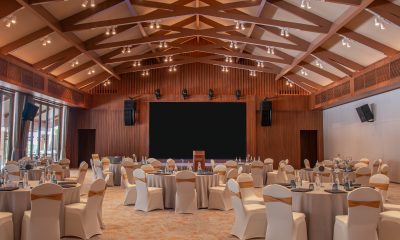
 Business6 days ago
Business6 days agoFeydhoo Hall opens at dusitD2 Feydhoo Maldives as new event space
-
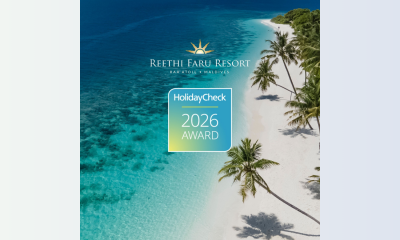
 Awards1 week ago
Awards1 week agoReethi Faru Resort recognised with HolidayCheck Award 2026
-
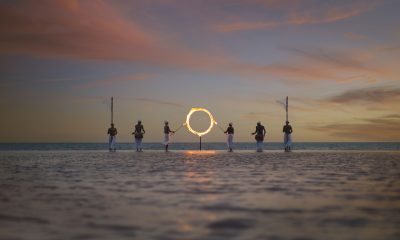
 Awards1 week ago
Awards1 week agoThe Ritz-Carlton Maldives, Fari Islands secures Forbes Five-Star rating for fourth consecutive year



